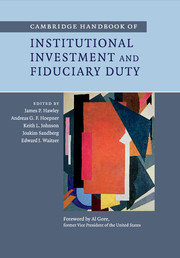Book contents
- Frontmatter
- Contents
- List of figures
- List of tables
- List of contributors
- Foreword
- 1 Introduction
- Part I Fiduciary duty: a global outlook
- Part II Fiduciary duty and the landscape of institutional investment
- Part III Challenging conventional wisdom on fiduciary duty
- 14 Is the search for excessive alpha a breach of fiduciary duty?
- 15 Fiduciary duty and sin stocks:is vice really nice?
- 16 Whose risk counts?
- 17 Sustainability, financial markets and systemic risk
- 18 Uncertain times, plural rationalities and the pension fiduciary
- 19 Emotional finance and the fiduciary responsibility of asset managers
- Part IV Towards a broader interpretation of fiduciary duty
- Part V Beneficiaries’ roles and viewpoints
- Part VI Fiduciary duty and governance
- Index
- References
18 - Uncertain times, plural rationalities and the pension fiduciary
Published online by Cambridge University Press: 05 April 2014
- Frontmatter
- Contents
- List of figures
- List of tables
- List of contributors
- Foreword
- 1 Introduction
- Part I Fiduciary duty: a global outlook
- Part II Fiduciary duty and the landscape of institutional investment
- Part III Challenging conventional wisdom on fiduciary duty
- 14 Is the search for excessive alpha a breach of fiduciary duty?
- 15 Fiduciary duty and sin stocks:is vice really nice?
- 16 Whose risk counts?
- 17 Sustainability, financial markets and systemic risk
- 18 Uncertain times, plural rationalities and the pension fiduciary
- 19 Emotional finance and the fiduciary responsibility of asset managers
- Part IV Towards a broader interpretation of fiduciary duty
- Part V Beneficiaries’ roles and viewpoints
- Part VI Fiduciary duty and governance
- Index
- References
Summary
[E]ven as the Federal Reserve continues prudent planning for the ultimate withdrawal of extraordinary monetary policy accommodation, we also recognize that the economic outlook remains unusually uncertain.
Ben S. Bernanke, chairman of the Federal Reserve, July 21, 2010Introduction
Modern portfolio theory is no longer quite the safe harbor for fiduciaries making investment decisions that it once was (Hawley et al. 2011). One reason for this is the prolonged uncertainty in the financial markets that was mentioned by chairman Bernanke in 2010 and which still seems to be with us two years (at the time of writing) down the line. In such an environment, the pension fiduciary faces both the external pressures stemming from a prolonged uncertain investment outlook, and the internal pressures stemming from employers and participants reacting to economic uncertainty and voicing their concerns related to the investment of pension assets. Fiduciaries have a duty to balance the interests of their different participant groups, and understanding the perspectives of those beneficiaries is critical to successful implementation of fiduciary obligations (Hawley et al. 2011; Berry and Scanlan 2014). From a practical perspective, unrecognized stakeholder expectations can pose risks to follow-through on implementation of investment strategies.
How should the pension fiduciary act when the expected correlations among asset classes fail to materialize? How should the pension fiduciary interpret the apparently mixed signals from plan sponsors whose reactions to the sudden exposure to significant unfunded liabilities range all the way from derisking (by shifting more plan assets into fixed income investments) to seeking higher expected returns (by increasing the plan’s exposure to hedge funds and private equities)? What is the framework for making asset allocation decisions in such an environment?
- Type
- Chapter
- Information
- Publisher: Cambridge University PressPrint publication year: 2014
References
- 1
- Cited by



